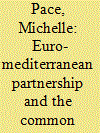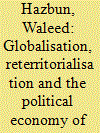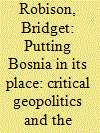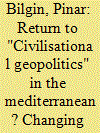| Srl | Item |
| 1 |
ID:
052103


|
|
|
|
|
| Publication |
Summer 2004.
|
| Summary/Abstract |
This article examines Samuel Huntington's claims that his civilisational theory rises to the level of paradigm and is not merely social science theory. This claim is examined in light of Huntington's focus on Islamic civilisation and its relationship to the ongoing war on terror. The specific manifestations of Islam that have been relevant to this war are placed within the context of what Jeffrey Herf refers to as reactionary modernism, which views violent reactions to modernity as alternative expressions of modernity. While Islam has civilisational characteristics, as Huntington suggests, the violence that gives rise to terror is a result of time- and region-specific reactionary modern variables, and is not inherent in Islam itself. Second, though civilisation-as-social science might shed light on policy options to deal with the problem of terror, civilisational theory is not equipped to supersede the interest-orientation of realism.
|
|
|
|
|
|
|
|
|
|
|
|
|
|
|
|
| 2 |
ID:
052099


|
|
|
|
|
| Publication |
Summer 2004.
|
| Summary/Abstract |
This article assesses the European Union's Mediterranean policy from a discursive perspective and focuses specifically on the actual, identifiable impact of the Union's security discourse. In doing so it seeks to demonstrate how the Union's Mediterranean security policy has impacted on issues of identity. The implicit reference to sub-regional cooperation in the Union's Common Mediterranean Strategy may be read as a way to facilitate the lack of a clear definition of exactly what type of security or rather insecurity the European Union as a whole is trying to address when dealing with its 'Mediterranean'.
|
|
|
|
|
|
|
|
|
|
|
|
|
|
|
|
| 3 |
ID:
052106


|
|
|
|
|
| Publication |
Summer 2004.
|
| Summary/Abstract |
The laudable aim to write history in terms of geopolitical 'ages' does not clarify the changes and varieties of geopolitics in a formal sense, i.e. the more explicit discussions about territory and politics among intellectuals and opinion makers. Judging by what we have considered to be geopolitics up to now, the author discerns certain common features (over and above the features that geopolitics shares with the general subject of political geography): the messianic experience of seeing new dimensions in the power scene and the mutual influence between academic and popular writing. This goes very well with the description of a 'social movement'. The consequence of this approach is that we should pay attention to the local (national) and historic setting that gives rise to geopolitics. It also implies that geopolitics is something that necessarily rises and falls with the occurrence of crises or 'peak' experiences. Further the concept of 'reframing', important in social movement theory, raises the question if we might be able to define a kind of transformation (of perspective) that is characteristic of geopolitics.
|
|
|
|
|
|
|
|
|
|
|
|
|
|
|
|
| 4 |
ID:
052100


|
|
|
|
|
| Publication |
Summer 2004.
|
| Summary/Abstract |
major limitation of most political economy studies of globalisation is that they view globalisation almost exclusively in terms of deterritorialisation. This essay, in contrast, emphasises how increases in the transnational mobility of people, capital and information can also result in reterritorialisation, which is the increased relevance of location and characteristics of place for global economic activity. In contrast to the erosion of the territorially based powers of nation-states often associated with deterritorialisation, the reterritorialisation of economic activity can increase the power and regulatory influence of state, societal and transnational agents who are able to exert control over territorial assets and the reterritorialisation process. The essay uses the concepts of deterritorialisation and reterritorialisation to develop a framework to analyse the changing political economy of one of the most understudied aspects of globalisation, the international tourism economy. With a focus on the development strategies of states in the Middle East and North Africa, the essay explores efforts to generate 'experiences of place' for tourists and territorial-based economic rewards for firms and their political consequences.
|
|
|
|
|
|
|
|
|
|
|
|
|
|
|
|
| 5 |
ID:
052104


|
|
|
|
|
| Publication |
Summer 2004.
|
| Summary/Abstract |
Through the first half of the twentieth century, strategists and statesmen in Britain struggled reconcile the advent of intercontinental air power with the geopolitical logic of the British Empire. This article explores how, and to what extent, their efforts might have catalysed the onset of British decolonisation.
|
|
|
|
|
|
|
|
|
|
|
|
|
|
|
|
| 6 |
ID:
052105


|
|
|
|
|
| Publication |
Summer 2004.
|
| Summary/Abstract |
India has been poorly understood and often neglected by the United States. Its emerging role and geopolitical importance in the evolving correlates of power in Asia has been underestimated and overlooked by America until recently. The following article traces the changing dynamics of India's geopolitical posture to better inform our understanding of where India is headed as an international actor before assessing India's current place in the evolving strategic environment in Asia. It also asserts that the key to India's future geopolitical disposition is to be found in how the idea of India evolves as a concept. The outcome of the competition between Indian secular and Hindu fundamentalist ideologies will play a key role in how India's internal dynamics and international posture evolve.
|
|
|
|
|
|
|
|
|
|
|
|
|
|
|
|
| 7 |
ID:
052102


|
|
|
|
|
| Publication |
Summer 2004.
|
| Summary/Abstract |
Media reporting of the Bosnian Conflict (1992-1995) was significant in shaping Western policy responses to the collapse of the former Yugoslavia. This article considers the role of the British print media in articulating and representing Bosnia as a place in the geographical imagination. Bosnia, for many, was a sophisticated place in the heart of Europe whilst for others it was Bosnia's Balkan identity and all the associated negative connotations which informed journalistic reports. Representations of Bosnia were further complicated by the use of historical and geographical analogies. Finally I argue that the war of words which defined the Bosnian conflict as a 'civil war' and the result of 'ancient ethnic hatreds' resulted in the war being seen as a humanitarian catastrophe requiring a humanitarian response. These contested and contradictory narratives of place had profound consequences for political and military strategies during the war and for the final settlement at Dayton in 1995.
|
|
|
|
|
|
|
|
|
|
|
|
|
|
|
|
| 8 |
ID:
052101


|
|
|
|
|
| Publication |
Summer 2004.
|
| Summary/Abstract |
Regionalisation in Russia is to be understood as part of the overall transformation process. It is argued that while the form of regionalisation during the Yeltsin era after 1991 presented an image of democratic legitimacy, it was still largely based on the same structures and characteristics as the 'regionalism' that took shape during the Soviet era. In this context, the real significance of Putin's federal reforms is to be seen in the fact that a number of the faults in this essentially Soviet system have been laid bare and challenged. Thus, Putin's reforms are not to be dismissed as a purely adminis-trative measure to strengthen central state power and control. Instead, they constitute an attempt to eliminate this form of regionalism in order to build a more favourable basis for Russia's integration into global economic contexts and structures. The fact that Russia is moving in this direction is not, however, solely attributable to Putin's federal reforms. There is a wide and diverse range of other factors propitious to this course.
|
|
|
|
|
|
|
|
|
|
|
|
|
|
|
|
| 9 |
ID:
052098


|
|
|
|
|
| Publication |
Summer 2004.
|
| Summary/Abstract |
The prevalence of the discourse of ideological geopolitics during the Cold War meant that both Turkey and the EU belonged to the West by virtue of their ideological orientation. In the absence of this prevalent geopolitical discourse, both the EU and Turkey have spent the 1990s trying to locate themselves geographically. Drawing on the literature on critical approaches to political geography and international relations, this article seeks to answer the question of whether the EU's post-Cold War security discourse on the Mediterranean in general and on relations with Turkey in particular point to a return to the earlier discourse of civilisational geopolitics. The article also presents a reading of Turkish policy makers' attempts to resist EU's representation of Turkey in 'non-Europe' (as with the 'Middle East' or the 'Mediterranean') as boundary-producing practices which have served to underline the boundaries between the 'West' and the 'non-West'.
|
|
|
|
|
|
|
|
|
|
|
|
|
|
|
|